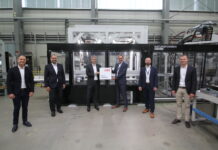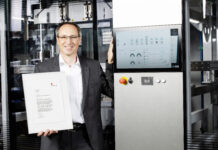
Sabic, a global enterprise in the chemicals industry, recently announced that Beiersdorf will be using certified renewable polypropylene (PP) from Sabic’s Trucircle portfolio of “second generation” bio-based materials in the skincare company’s cosmetics packaging. The new packaging products will be introduced in the market in 2021 and replace fossil-based virgin PP.
Sabic’s certified renewable polymers, including various PP and polyethylene (PE) materials, are derived from animal-free and palm oil-free “‘second-generation”‘ renewable feedstock, such as tall oil waste from the wood pulping process in the paper industry, which is not in direct competition with human food and animal feed production sources.
“The use of renewable raw materials in our product packaging represents a major lever for us to reduce our carbon emissions and improve our ecological footprint,” says Michael Becker, head of Global Packaging Development at Beiersdorf. “We are proud to be the first in our mass-market segment to use polypropylene made from renewable, plant-based raw materials as a packaging material for our cosmetic products, and we are pleased to have a strong, experienced partner with Sabic. Together, we take an important next step towards achieving our ambitious sustainability targets.”
As part of its care beyond skin sustainability agenda with ambitious targets to be implemented by 2025, Beiersdorf wants to make its packaging 100 percent refillable, reusable, or recyclable, increase the share of recycled material in plastic packaging to 30 percent, and reduce the use of fossil-based virgin plastic by 50 percent (compared to 2019).
“We are very pleased to welcome Beiersdorf on our journey towards transforming the plastics industry into a circular and sustainable economy,” comments Sergi Monros, vice president of Performance Polymers and Industry Solutions for Petrochemicals at Sabic. “Innovative cosmetics packaging using our certified renewable PP and PE polyolefins can make a significant contribution to reducing fossil depletion and greenhouse gas emissions. The plant-based materials provide easy drop-in solutions to existing fossil-based plastic conversion processes and applications without compromises on purity, quality, safety, or convenience. Sabic is determined to help support its partners in benefiting from this potential.”
Sabic’s certified renewable polymers are based on a mass balance approach in compliance with the widely recognized International Sustainability & Carbon Certification (ISCC PLUS) scheme. The mass balance is determined to allocate the renewable content used in the production and conversion of the plastic material to the ultimate application. This allows brand owners to highlight and quantify the sustainable choice consumers can make by purchasing end products packaged in renewable plastics. The ISCC Plus accreditation verifies that the mass balance accounting follows predefined and transparent rules. In addition, the certification also provides traceability throughout the partners’ entire supply chain from the feedstock to the final product.
Moreover, a cradle-to-gate lifecycle analysis has confirmed the sustainability elements of Sabic’s certified renewable materials. From sourcing the raw feedstock to producing the polymers, each ton of the company’s bio-based PP and PE resin reduces CO2 emissions by an average of 4 kilogram as compared to fossil-based virgin alternatives, while at the same time cutting fossil depletion by up to 80 percent[1]. The study was carried out according to ISO 14040 and has been validated in a critical third-party review.
Sabic’s complete Trucircle offering comprises design for recyclability services, mechanically recycled materials, certified circular products from chemical recycling of used plastics, and certified renewable polymers from bio-based feedstock.
[1] Cradle to Gate (kilogram CO2 equivalent to kilogram of polyolefin) ReCiPe 2016 Midpoint (H) V1.03 / World 2010H
Effects of the use of biogenic carbon quantified according to PAS 2050 standard LCA done by at Sabic according to ISO 14040, using the Circularity Footprint Formula (CFF) following the Product Environmental Footprint (PEF) guidance of the European Commission, and reviewed by third-party experts according to ISO 14067
Sabic is a global diversified chemicals company headquartered in Riyadh, Saudi Arabia. Sabic manufactures on a global scale in the Americas, Europe, Middle East, and the Asia Pacific, making distinctly different kinds of products: chemicals, commodity, and high-performance plastics, agri-nutrients, and metals.
Sabic supports its customers by identifying and developing opportunities in key end-use applications such as construction, medical devices, packaging, agri-nutrients, electrical and electronics, transportation, and clean energy. Production in 2019 was 72.6 million metric tons.
Sabic has more than 33,000 employees worldwide and operates in around 50 countries. Fostering innovation and a spirit of ingenuity, Sabic has 12,540 global patent filings and has significant research resources with innovation hubs in five key geographies – USA, Europe, Middle East, South Asia, and North Asia.
Beiersdorf AG is a leading provider of innovative, high-quality skincare products and has more than 135 years of experience in this market segment. The Hamburg-based company has about 20,000 employees worldwide and is listed on the DAX, the German benchmark equities index. Beiersdorf generated sales of EUR 7.6 billion in financial year 2019. Its product portfolio comprises strong, international leading skin and body care brands, including Nivea, Eucerin, Hansaplast/Elastoplast, and La Prairie. Millions of people around the world choose Beiersdorf brands every day because of their innovative, high-quality products. Further renowned brands such as Labello, Aquaphor, Florena, 8X4, Hidrofugal, Atrix, Maestro, and Coppertone round off the extensive portfolio. Beiersdorf’s wholly-owned affiliate tesa SE, another globally leading manufacturer in its field, supplies self-adhesive products and system solutions to industry, craft businesses, and consumers.








